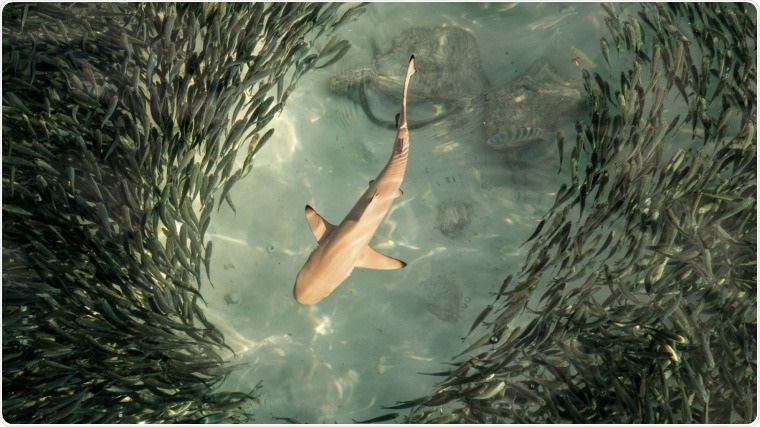The lives of wild animals are fraught with dangerous situations with uncertain results. Whether the animals are investigating new habitats in unknown terrain or looking for new food sources, they always have a risk of being caught and killed by predators.

Dangerous food search: A swarm of fish meets a blacktip reef shark. Image Credit: Oliver Krüger.
In several cases, the very survival of these animals relies on a single decision. Whether an animal prefers to prevent danger or chooses to take a risk differs significantly from one individual to another.
Just as there are humans who are more cautious and others who take more risks, among animals of a particular species there are also individuals that are more or less risk-averse.”
Holger Schielzeth, Professor and Population Ecologist, University of Jena
To some extent, these variations are innate but to a significant extent they also rely on the development of an individual. As currently demonstrated in a comprehensive meta-analysis by Professor Schielzeth, his Bielefeld collaborator Professor Klaus Reinhold, and their research groups, the risk appetite of an animal is conclusively governed by the nutritional conditions it goes through while growing up. The team has reported their results in the new issue of the specialist journal, Biological Reviews.
Study results involving over 100 animal species compared
Working with the study’s lead author Nicholas Moran, the team examined over 120 experimental studies that involved over 100 animal species and the results. They studied various species, like spiders, birds, amphibians, fish, crustaceans, and insects. Common to all the analyses was the fact that phases of good and bad nutrition were experienced by the animals, and that their risk appetite was quantified later in life.
There were two conflicting theories:
On the one hand, one could assume that animals that have always enjoyed good circumstances and are therefore in a better condition would have more to lose and would therefore be more risk-averse.”
Klaus Reinhold, Professor Evolutionary Biologist, Bielefeld University
Conversely, a better nutritional status could imply that an animal would get away more easily from dangerous situation, and hence would be more likely to take a risk, Reinhold added.
The analysis of all the study results has now made things clear. When there is an inadequate food supply, animals tend to engage in higher-risk behavior—that is, the willingness to take risks increases by an average of 26% in animals that have experienced hunger previously in their lives.
Schielzeth added, “We were surprised that this result was so clear and unambiguous.”
The correlation applied to almost all the behavioral contexts analyzed, like migration, exploration behavior, and risky searches for food sources. They were indeed differences in the strength of the effect. Nonetheless, Schielzeth believes that this correlation may also be there in humans, at least to some degree, because humans are also an “animal species.”
The meta-analysis was performed within the framework of the Collaborative Research Centre Transregio 212, “A Novel Synthesis of Individualisation across Behaviour, Ecology and Evolution: Niche Choice, Niche Conformance, Niche Construction” (NC3), which is built at the universities of Bielefeld and Münster, and in which the University of Jena has also participated. Dr Nicholas Moran is presently an MSCA Research Fellow at the National Institute of Aquatic Resources, Technical University of Denmark.
Source:
Journal reference:
Moran, N. P., et al. (2020) Poor nutritional condition promotes high‐risk behaviours: a systematic review and meta‐analysis. Biological Reviews. doi.org/10.1111/brv.12655.